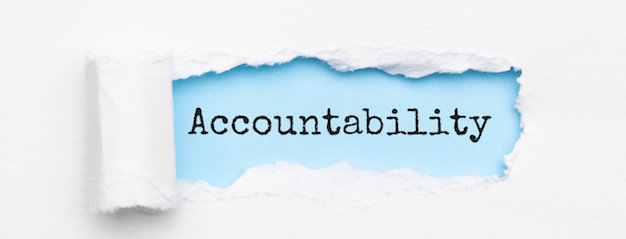So then each of us will give an account of himself to God.
– Romans 4:17
Accountability. That’s not a popular topic these days. Unless of course it is used to lay blame on someone besides ourselves. The definition of accountability is simple and to the point: an obligation or willingness to accept responsibility or to account for one’s actions. This rational sure seems to imply that accountability is meant to be used to judge ourselves and take action in those areas needed. The opposite of accountability is immunity, as in being protected or exempt from something.
We live in a culture that seems to fear accountability. Excuses are constantly made to seek to justify one’s behaviors or lack of responsibilities. Many react by pointing a finger at anything that can take the spotlight off of them. It wasn’t me, it wasn’t my fault, no one told me, no one helped me. Instead of accepting and learning from accountability, we are quick to shift blame. In essence, trying to convince others as well as ourselves that we are immune from our responsibilities. That’s a hard way to live because it’s based in mistrust and fear. Though accountability when not met usually carries some hard consequences, they are in no way near the consequences that trying to pass the blame on to others carry. Things like a breakdown of trust from others and increased conflict in even the simplest situations. And yet, our human nature, if not reined in, seems to default to self-justification and avoidance of personal accountability.
Unfortunately, this is nothing new. It was there in the Garden, in the beginning. It wasn’t me, it was the serpent. It wasn’t me, it was the woman. Cascading down through history, we find ourselves in a precarious position living in a world who thrives on the blame game.
Grace is the unmerited favor of God. It is the Father’s gift to us through His Son Jesus Christ. That sounds pretty great. In fact, that sounds pretty wonderful. Who wouldn’t want the unmerited favor of God? Especially when it is wrapped up in the form of a gift. But there is a catch. In order to unwrap and accept this amazing gift from God, we have to come to a place of, you guest it, accountability. Grace is the gift of Jesus and His atonement for our sins. If we falsely believe or attempt to avoid our responsibility when it comes to sin, in other words, deny our accountability, then why would we ever need the gift of grace? However, the harsh reality is that no one is immune to sin, no one is protected or except from the consequence of a sinful nature, which is eternal death. No one except the born-again believer who, through their accountability or willingness to accept and account for their sinful actions has humbly surrendered before God as a wretched person beyond excuse. It is at that point of accountability, that point of admission, that point of confession that the gift of grace becomes available.
As born-again believes, we now have the realization of grace and the justification that it brings before the Father. We rejoice in this. It literally changes our life and the deep appreciation to our Lord can never be compared to anything else.
But how much does this transition to other aspects of our life? If we understand and embrace God’s grace and acknowledge that we are accountable, not just to ourselves, but before Him, how should that change how we live our lives? The born-again believes separates themselves from the world in the sense that they are no longer confined to the world’s standards. The born-again believer chooses to live by God’s standards, not simply compartmentalized within their faith, because their faith cannot be compartmentalized. Jesus isn’t for a time or place, rather Jesus is glorified at all times and in every place. That means that personal accountability from the biggest things, like our sin to the littlest thing, like minor responsibilities must be exercised. If we blame and point fingers in the small stuff, we are at risk for trying to justify within ourselves the big things.
Jason Metz, lead Pastor












